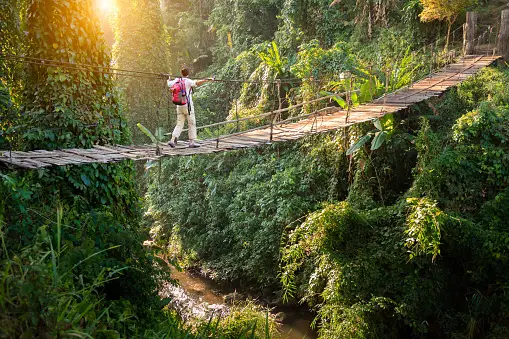Ph.D. in Ecotourism: Introduction, Admission, Registration, Eligibility, Duration, Fees, Syllabus 2024

Introduction:
In an era where sustainability is paramount, ecotourism emerges as a beacon of responsible travel, offering unique experiences while preserving natural environments and cultural heritage. Pursuing a Ph.D. in Ecotourism delves into the complexities of sustainable tourism management, environmental conservation, and community engagement. This guide serves as a roadmap for those passionate about ecotourism research, providing insights into admission procedures, eligibility requirements, completion timelines, career pathways, and more.
Admission Process:
- Submit an application to the university's environmental science or tourism department, specifying the Ph.D. program in Ecotourism.
- Provide academic transcripts, letters of recommendation, and a research proposal outlining interests in ecotourism, sustainability, and related fields.
- Demonstrate proficiency in research methodologies, environmental science, or tourism management through academic achievements or professional experience.
- Participate in interviews or presentations to discuss research interests and fit with the program.
Eligibility:
- A Master's degree in Environmental Science, Tourism Management, Sustainable Development, or a related field.
- Strong academic background with coursework in environmental conservation, tourism planning, community development, or sustainable tourism practices.
- Demonstrated research experience or interest in ecotourism, environmental conservation, cultural heritage, or sustainable development.
- Proficiency in relevant research methods, data analysis, and communication skills.
Completion Time:
Typically ranges from 3 to 5 years, depending on the complexity of the research project, fieldwork requirements, and individual progress.
Career Opportunities:
- Academic positions in universities and research institutions, teaching courses in ecotourism management, environmental conservation, sustainable tourism planning, or cultural heritage preservation.
- Employment in government agencies, non-profit organizations, or international bodies, focusing on ecotourism policy development, environmental impact assessment, or community-based tourism initiatives.
- Roles in private sector organizations, eco-lodges, tour operators, or sustainable travel companies, in positions like ecotourism manager, sustainability coordinator, or destination marketing specialist.
- Opportunities for entrepreneurship, consultancy, or freelance work, offering services in ecotourism development, sustainable tourism certification, or destination management.
Syllabus:
- Core courses covering principles of ecotourism, sustainable tourism management, environmental conservation, and cultural heritage preservation.
- Advanced seminars on ecotourism planning, community-based tourism, wildlife tourism, eco-friendly practices, and sustainable destination development.
- Electives in related disciplines like environmental economics, sociology, anthropology, or geography, providing interdisciplinary perspectives on ecotourism research.
Internship Opportunities:
- Collaborate with ecotourism operators, conservation organizations, or community-based tourism projects for internships, gaining hands-on experience in sustainable tourism practices, environmental monitoring, or cultural immersion.
- Engage in fieldwork or research projects with university partners, exploring ecotourism destinations, assessing environmental impacts, or evaluating community benefits.
- Participate in volunteer programs, eco-volunteering, or citizen science initiatives, contributing to conservation efforts while gaining practical insights into ecotourism management.
Scholarships and Grants:
- Institutional funding through graduate assistantships, research grants, or teaching positions.
- External scholarships provided by government agencies, foundations, or non-profit organizations supporting research in ecotourism, environmental conservation, or sustainable development.
- Funding opportunities specifically targeting projects addressing pressing environmental issues, biodiversity conservation, or community empowerment in ecotourism destinations, based on academic merit or research potential.
FAQs:
What distinguishes ecotourism from traditional tourism?
Ecotourism focuses on responsible travel to natural areas that conserve the environment, support local communities, and provide educational experiences, while traditional tourism may prioritize commercial interests and mass tourism development.
What research areas can I explore within a Ph.D. in Ecotourism?
Research areas may include sustainable tourism planning, wildlife tourism management, community engagement, ecotourism impacts on biodiversity, climate change adaptation, or cultural heritage preservation.
How can I engage with local communities and indigenous peoples in ecotourism research?
Collaborate with local stakeholders, indigenous communities, or grassroots organizations to co-design research projects, incorporate traditional knowledge, and ensure the equitable distribution of benefits from ecotourism activities.
Are there opportunities for international collaboration or fieldwork during the Ph.D. program?
Yes, many Ph.D. programs offer opportunities for international collaboration, joint research projects, or fieldwork in ecotourism destinations around the world, fostering cross-cultural exchange and global perspectives.
How does a Ph.D. in Ecotourism prepare graduates for careers in sustainable tourism?
The program equips graduates with advanced knowledge, research skills, and practical experience in sustainable tourism management, environmental conservation, and community development, preparing them for leadership roles in the ecotourism sector.





